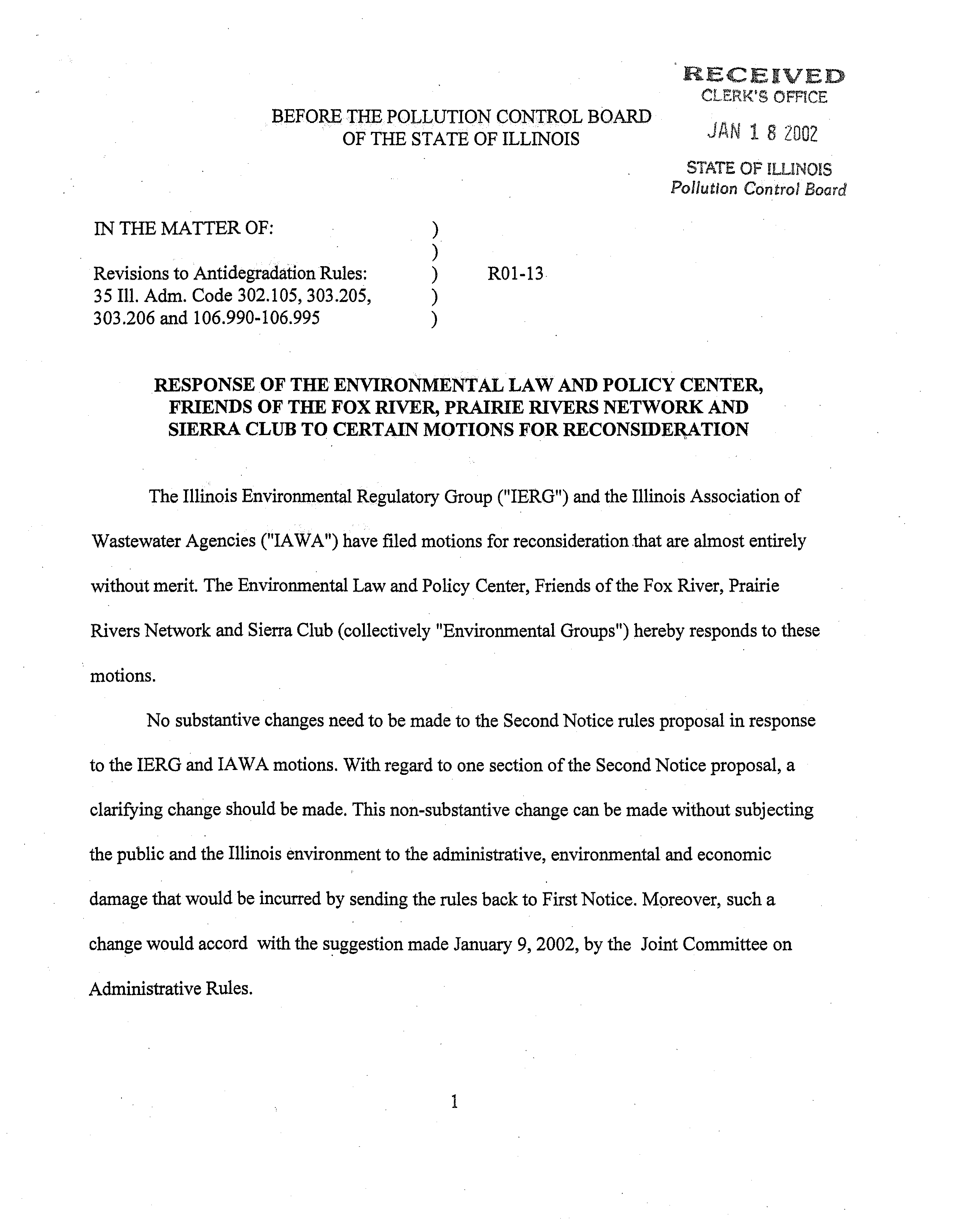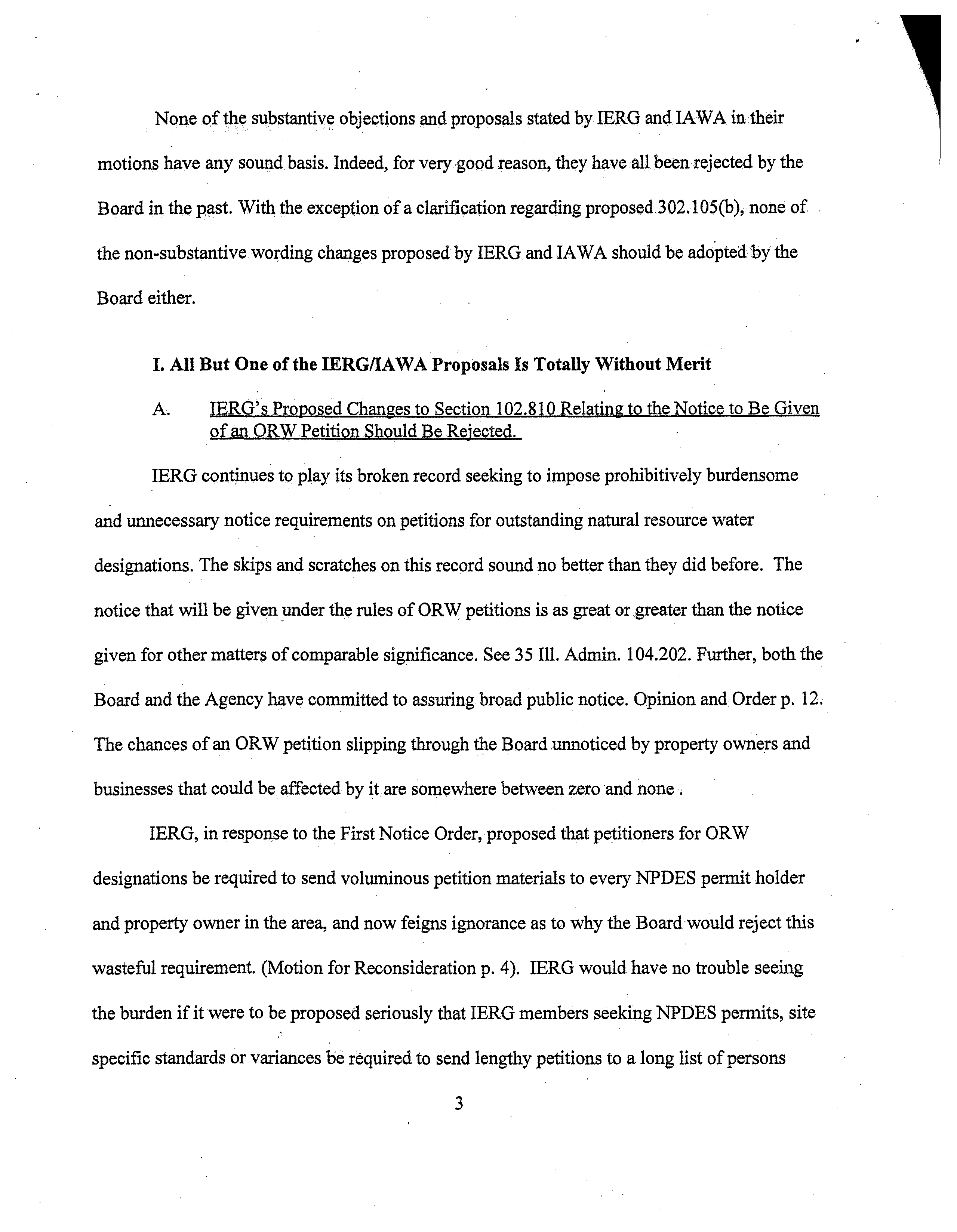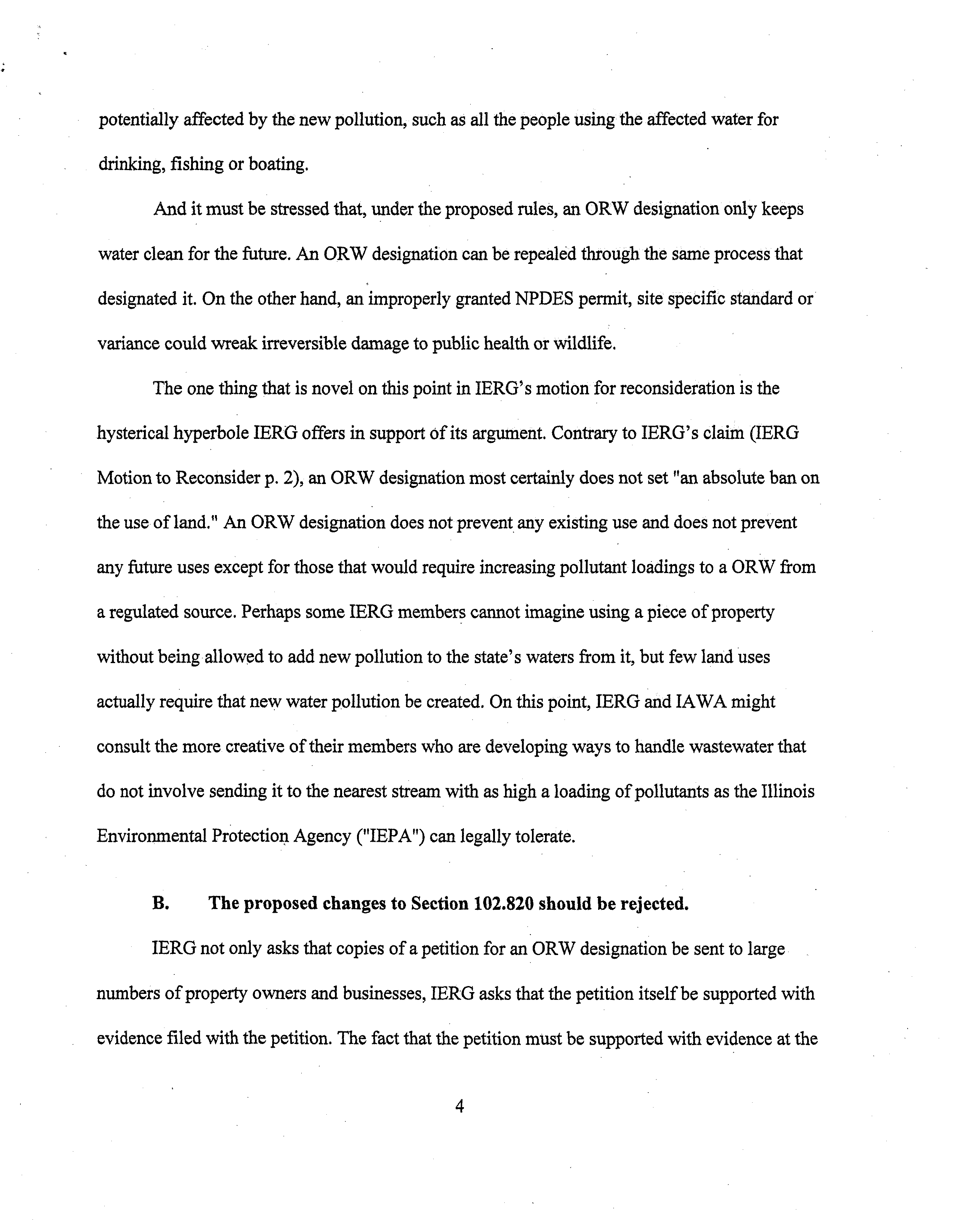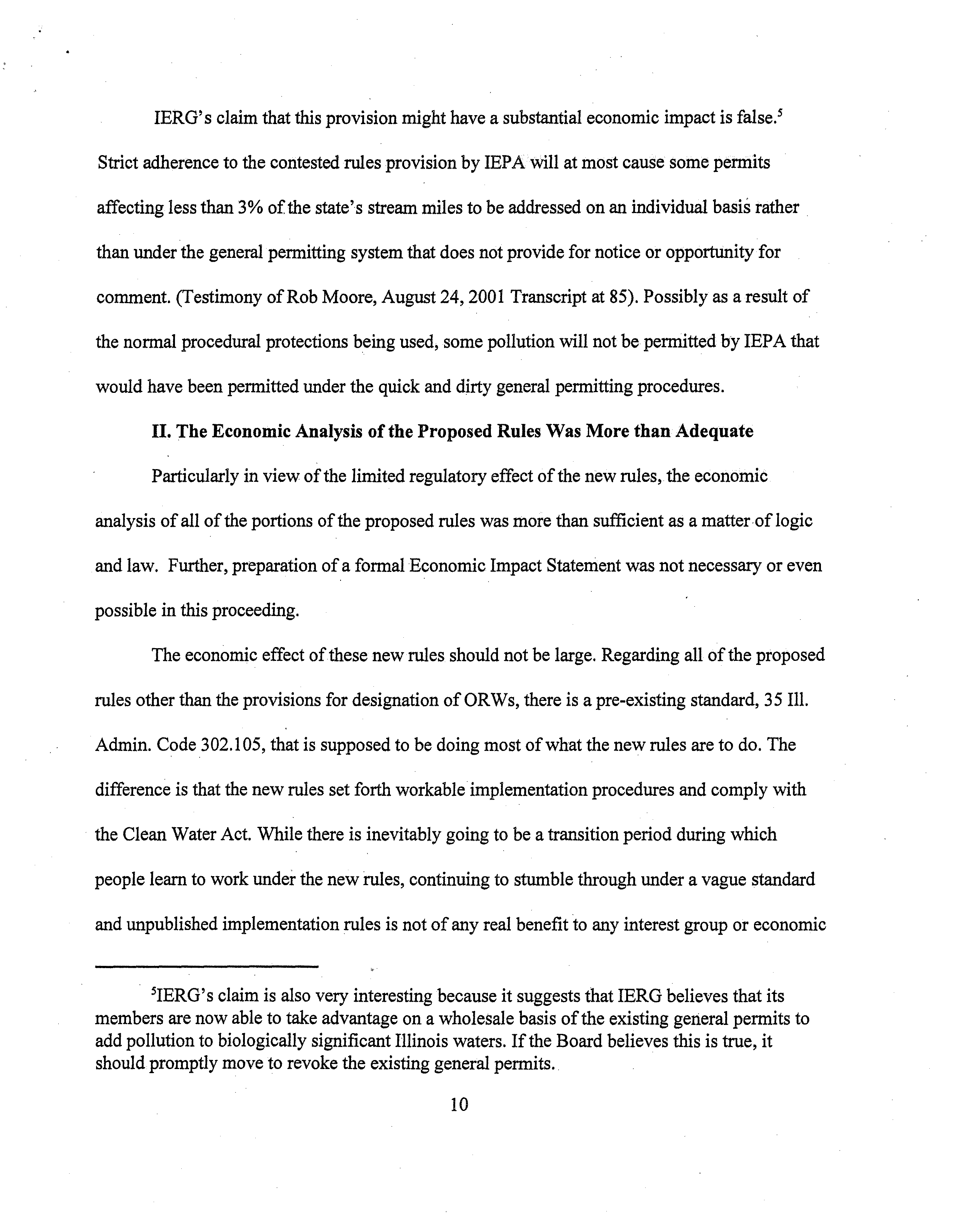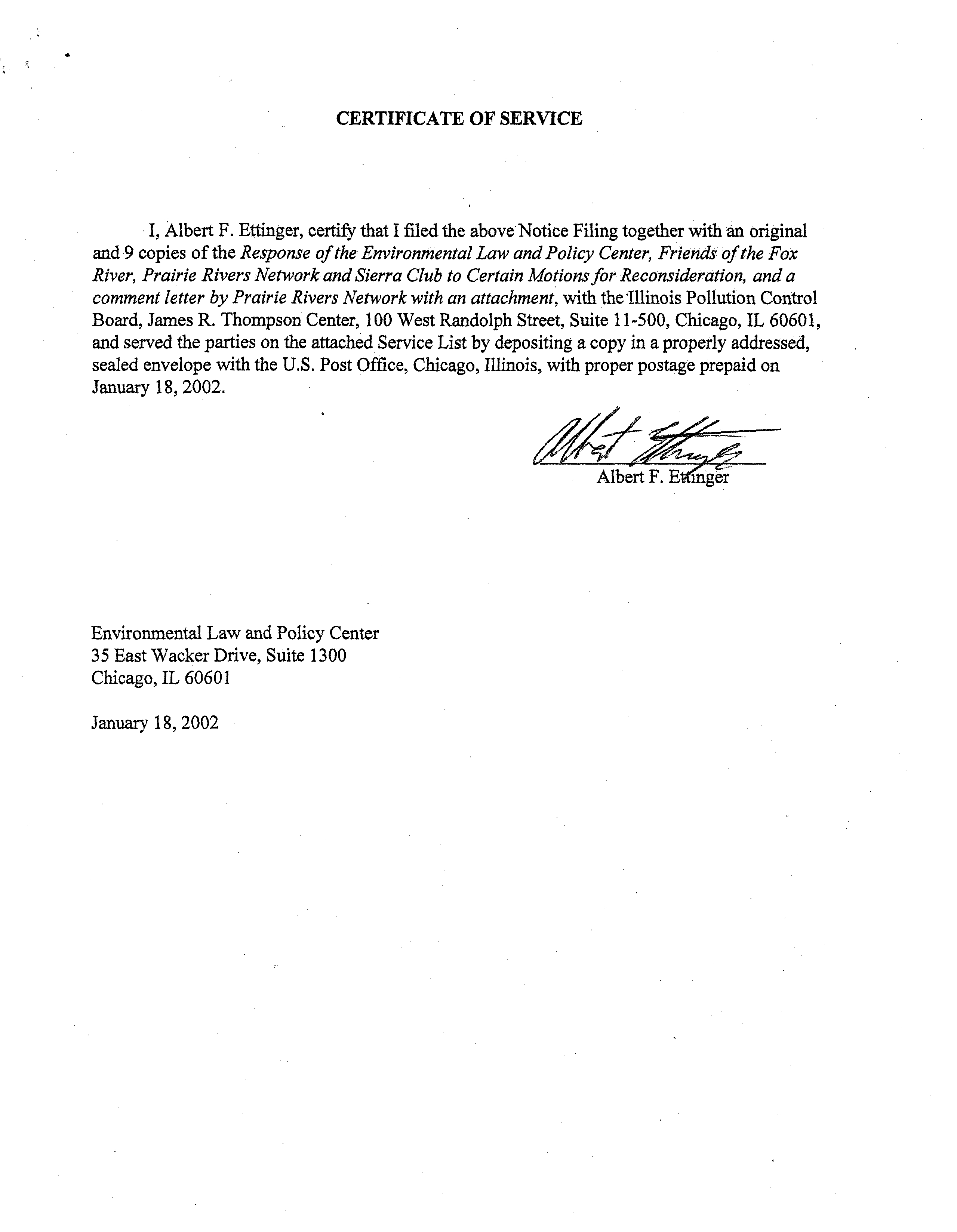BEFORE
THE
ILLII’401S POLLUTION CONTROL BOAR)
~
1
S
2002
IN THE MATTER
OF
)
)
REVISIONS TO ANTIDEGRADATION RULES
35 ILL.
ADM.
CODE 302.105, 303.205, 303.206, AND
)
106.990-106.995
)
)
)
STATE OF !WNOiS
Poll~tj~~
Control Board
R01-13
(Rulemaking
-
Water)
NOTICE OF FILING
PLEASE TAKENOTICE that ON THIS DATE, January 18,2002,1 filed with Dorothy
Gunn, Clerk ofthe Illinois Pollution Control Board,
James R. Thompson Center, 100 West
Randolph, Suite 11-500, Chicago, IL 60601, the enclosed Response ofthe Environmental Law
and
Policy Center, Friends ofthe Fox River, Prairie Rivers Network
and
Sierra Club to Certain
Motions for Reconsideration,
and
a comment letter by Prairie Rivers Network with an
attachment, copies ofwhich
are
herewith served upon you.
AlbertF. Ettinger
ARDC
*~3125045)
Counselfor Environmental Law & Policy
Center, Friends oftheFox River, Prairie
Rivers Networkand Sierra Club
35
East
Wacker
Drive, Suite
1300
Chicago, IL 60601-2110
(312) 795-3707
January 18, 2002
RECEIVED
CLERK’S
OFFICE
BEFORE THE POLLUTION CONTROL
BOARD
OF THE STATE
OF ILLINOIS
JAN
1
8
2002
STATE OF
ILLINOIS
Pollutfon
Control BoQrd
IN
THE
MATTER OF:
)
)
Revisions to
Antidegradation
Rules:
)
R01-13.
35 Iii. Adm.
Code 302.105, 303.205,
)
303.206 and 106.990-106.995
)
RESPONSE OF
THE
ENVIRONMENTAL LAW AND POLICY CENTER,
FRIENDS OF
TIlE
FOX RIVER,
PRAIRIE RIVERS
NETWORK
AND
SIERRA CLUB TO CERTAIN MOTIONS FOR RECONSIDERATION
The Illinois Environmental
Regulatory Group
(“IERG”)
and
the
Illinois Association of
Wastewater Agencies (“IAWA”) have filed motions for reconsideration that
are
almost entirely
without merit. The Environmental Law and Policy Center, Friends ofthe Fox River, Prairie
Rivers Network
and
Sierra Club (collectively “Environmental Groups”) hereby responds to these
motions.
No substantive changes need to be made to the Second Notice rules proposal in response
to the IERG and IAWA motions. With regard to one section ofthe Second Notice proposal, a
clarifying
change should be made.
This
non-substantive change
can
be made without subjecting
the public
and
the Illinois environment to the administrative,
environmental and economic
damage that would be incurred by sending the rules back to First Notice. Moreover, such a
change would accord
with
the suggestion made January 9, 2002, by the
Joint Committee on
Administrative Rules.
1
There are no substantial economic costs to adopting these rules.
To a large extent, these
rules elaborate on and
clarify
existing regulations. See 35 Ill.
Admin.
Code 302.105. The claim
by IERG and IAWA that the portion ofthe rules regarding designation ofoutstanding resource
waters (“ORWs”) will impose major new costs ignores the fact that no ORWs have been
designated and none can be designated in the future without extensive further proceedings at
which the costs ofthe designation will be considered fully.
Oii the other hand, the costs of further delay in establishing antidegradation rules that
comply with federal law are substantial.
The requirements ofthe currentnondegradation rule, 35
Ill. Admin. Code 3 02.105, are not legally sufficient because they do not provide implementation
procedures or allow for ORW designations.’
The current rules do not give adequate instructions
to National Pollutant Discharge Elimination System (“NPDES”) permit writers or Illinois EPA
officials responsible for making certification decisions under Section 401
ofthe Clean Water
Act,
33 U.S.C.
§1341
(“CWA 401
certification”).
Failure to enact antidegradation
implementationrules seriously compromises Illinois implementation offederal requirements
mandated by the Clean Water Act.
Moreover, while the Agency is attempting to issue sound
permits under the existing standard and unpublished interim rules, the continuing hiatus in the
rules has led to confusion and permitting ofpollution that could have been avoided with better
procedures and planning.
See PUD No.1 ofJefferson County v. Washington Department ofEcology,
511 U.S.
700, 718-19 (1994);
The Raymond Proffitt Foundation v. U,S.
Environmental Protection
Agency, 930 F.Supp.
1088 (E.D. Pa.
1996);
Columbus & Franklin County Metropolitan Park
District v.Shank, 65 Ohio
St. 86, 600N.E. 2d
1042 (1992); 40 CFR §~131.6,
131.12.
2
None ofthe substantive objections andproposals stated by IERG and IAWA in their
motions have any sound basis. Indeed, for very good reason, they have all beenrejected by the
Board in the past. With the exception ofa clarificationregarding proposed 302.105(b), none of
the non-substantive wording changes proposed by IERG and IAWA should be adopted by the
Board either.
I. All But One of the
IERG/IAWA Proposals Is Totally Without Merit
A.
IERG’s Pronosed Changes to Section
102.8 10 Relating to the Notice to Be Given
ofan
ORW Petition Should Be Relected,
IERG continues to play its broken record seeking to
impose prohibitively burdensome
and unnecessary notice requirements on petitions for outstanding natural resource water
designations. The skips and scratches on this record
sound
no better than they did before.
The
notice that will be given under the rules ofORW petitions is as great or greater than the notice
given for othermatters ofcomparable significance.
See 35 Ill. Admin.
104.202. Further, both the
Board and the Agency have committed to assuring broad public notice.
Opinion and Order p.
12.
The chances ofan ORW petition slipping through the
Board
unnoticed by property owners and
businesses that could be affected by it are somewhere between zero and none.
IERG, in response to the FirstNotice Order, proposed that petitioners for ORW
designations be required to send voluminouspetition materialsto every NPDES permit holder
and property owner in the area, and now feigns ignorance as to why the
Board
would reject this
wasteful requirement.
(Motion for Reconsideration p.
4).
IERG would have no trouble seeing
the burden ifit were to be proposed seriously that IERG members seeking NPDES permits, site
specific standards or variances be required to send lengthy petitions to a long list ofpersons
3
I
potentially affected by the new pollution, such as all the people using the affected water for
drinking, fishing orboating.
And it must be stressed that, under the proposedrules, an ORW designation only keeps
water clean for the future. An ORW designation can be repealed through the same process that
designated it.
On the other hand, an improperly granted NPDES permit,
site specific standard or
variance could wreak irreversible damage to publichealth or wildlife.
The one thing that is novel on this point in IERG’s motion for reconsideration is the
hysterical hyperbole IERG offers in support Ofits argument.
Contrary to
IERG’s claim (IERG
Motion to Reconsider p. 2), an ORW designation most certainly does not set “an absolute ban on
the use ofland.” An ORW designation does notprevent any existing use and does not prevent
any future uses except for those that would require increasing pollutant loadings to a ORW from
a regulated source. Perhaps some IERG members cannot imagine using apiece ofproperty
without being allowed to add newpollution to the state’s waters from it, but few land uses
actually require that new water pollution be created. On this point, IERG and IAWA might
consult the more creative oftheir members who are developing ways to handle wastewater that
do not involve
sending it to the nearest stream with as high a loading ofpollutants as the Illinois
Environmental Protection Agency (“IEPA”) can legally tolerate.
B.
The proposed changes
to Section
102.820 should be
rejected.
IERG not only asks that copies of apetition for an ORW designation be
sent to large
numbers of
property
owners and businesses, IERG asks that the petition itself be supported with
evidence filed with the petition. The
fact that the petition must be supported with evidence at the
4
hearing is not good enough for IERG. IERG purports to fear that the Board will allow petitioners
to surprise petition opponents with unanticipated evidence at hearings and then not allow the
oppOnents time to respond. Not even the requirement ofSecond Notice section 102(h) that
petitioners support their petition with a synopsis ofthe testimony is sufficient to allay IERG’s
claimed fears of surprise.
IERG is engaging in either paranoia or disingenuous argument.
As written, the rules
require more ofpetitioners for ORWs than for persons seeking permission to increase pollution.
The Board rules provide for extensive notice to
the public ofBoard proceedings. There is no
reason to require still more protections against an ORW designation being made without full
consideration ofall the evidence. Indeed, if IERG’s real
object is to make it so difficult to
petition for an ORW designation that there will be few or no petitions, it has already
accomplished its mission.
C.
IERG’s Proposed Change to Section
302.105(b) Adds some Clarity
and
Should Be Accepted by
the
Board.
The Environmental Groups believe that the Board’s December 6, 2001
Opinion and
Order makes clear that there is no substantial issue relating to 302.105(b). The language ofthe
opinion quoted by IERG (Motion for Reconsideration p.
11) states that pollutant loadings falling
into the categories listed
in 302.1 05(b)(1) are allowed as well as those falling under 302.105
(b)(3). However,the rule language could be clearer.2
2
One can only wish that the rest ofthe Illinois Administrative Code had so few issues.
5
The wording change proposedby IERG for 302.105(b)(3)
is clearer than the Second
Notice language.3
Making the technical amendment proposed by IERG to this section without
returning to FirstNotice, would comply fully with the suggestion ofthe Joint Committee on
Administrative Rules (“JCAR”), It also would comply with the Administrative Procedure Act
which explicitly allows non-substantive changes and changes made at the suggestion ofJCAR.
5
ILCS
100/5-40(c).
D.
IERG’s Proposed Clarification of
302.105(c) Makes the
Rule
Less Clear
and
Should Be Rejccted.
IERG’s proposed change to 302.105(c), interpreted one way is totally redundant and
unnecessary. Under other possible readings ofIERG’s proposal, the proposal is legally erroneous
and inconsistent with the Clean Water Act.
The Environmental Groups failed to objectto
IERG’s proposed language when it was proposed in October, because they did notnotice it, and
are thankful that the Board wisely rejected it.
The Board should reject this language again.
The first sentence ofSection 302.105(c) ofthe Second Notice Board proposal
makes
quite clear that only increases in pollutant loadings that necessitate a new permit or a change in
an existing permit are subject to antidegradation analysis. IERG asks, however, that the same
thing be said again in a slightly different way by proposing that language be added stating that “if
apollutant is subjectto
an existing permit limit, an antidegradation
assessment shall notbe
required unless the proposed increase in pollutant loading would result in an exceedence ofsuch
limit.” (Motion for Reconsideration p.
13). This redundant language does not add transparency, it
~Given the rest ofthe positions taken in this response, we trust that our agreement with
IERG in this instance will not cause us to be accused oftepid advocacy:
6
adds confusiOn.
We assume that IERG does not mean any substantial harm (inthis case) but sought only
to add yet more language to the rules
saying
that ifa pollution loading 1s already~permitted,
it
need not go throughan antidegradation analysis to continue to be permitted.
But IERG’ s
proposal inadvertently creates ambiguity in two ways. This canbe illustrated by looking at
possible revisions to a hypothetical existing permit that allows a discharge of 1
million gallons
per day ofwastewater containing two pollutants, A and B, each at concentrations of 1
part per
million.
First, a discharger holding this hypothetical existing permit that seeks to increase its
discharge of A, butnotB, could argue that under the proposed IERG language, there should be
no antidegradation analysis ofthe increase in A because “a pollutant”
(B) is subject to an existing
permit limit and theproposed increased
loading ofA would not result in an exceedence ofthe
existing permit limit for B. Second, it might be argued that increasing the loading
(e.g.
discharging 2 million gallons per day), without increasing the concentration, of A or B or both is
permissible because both A and B are subject to an existing permit limit (concentration
?
lppm)
and the increased loading would not result in an exceedence ofthat limit. One would hope that
the Agency and the Board would reject such interpretations ofthe IERG proffered language if it
became part ofthe rule giventhat those interpretations would clearly violate ~the
intent ofthe
Board and the purpose ofantidegradation.
Still, the effect ofthe language proposed by IERG if
added to the rule, would be pernicious.
7
G.
TheBoard Should Reject Proposed IERG Changes to Section
302.105(d)
IERG argues strenuously againstlanguage
in the rule directing the Agency not to allow
new pollution
under
a general permit where it would affect waters ofparticular biological
significance.
IERG claims that this language creates a new “tier 4”
set ofprotections that are
somehow inconsistent with the IEPA proposal and agreements reachedby the workgroup that
met for two and a half
years
before the Agency submitted its proposal a year and a half ago.4
In fact,
IERG’s “tier 4” is a mirage.
Once again IERG is attacking a strawman and
misrepresents the import ofthe Board’s Second Noticeproposal. The Board language that IERG
is attacking here actually represents a compromise,
The language in issue does not determine when new pollution affecting waters of
particular biological
significance can be permitted. The question is only whether such an activity
can be permitted under the quickie general permit procedure that allows for permitting without
any notice or other process to the public or the IllinoIs Department of
Natural
Resources
(“IDNR”).
Because of the great danger ofimproper pollution being allowed under these
circumstances, the Environmental Groups initially opposed any use ofgeneral permits to allow
new pollution.
On this and many other issues, the Environmental Groups did not get their way.
However, in order to reignin slightly the danger to the environment ofallowing new
pollution under general permits, the Board has directed the Agency not to allow new pollution
~It is ironic that IERG pretends to be concerned about the sanctity ofthe Agency
proposal and the workgroup process. Throughout these proceedings the Environmental Groups
have generally supported the Agency proposal and urged only a few changes, mainly as to
general permits, where it was felt that the Agency proposal was not sufficiently protective. On
the other hand, IERG has made numerous broad attacks on the Agency proposal.
8
affecting waters of
particular
biological significance under general permits but instead to regulate
such new pollution under individual permits that,are subject to an antidegradation analysis, The
Board further stated that the Agency could consult a document, created after years ofstudy by
IDNR, in determining some ofthe circumstances in which the Agency should not allow new
pollution under a general permit.
Ofcourse, a finding by the Agency that the new pollution
cannot be allowed under a general permit does not mean that it cannot be permitted, only that the
public notice and otherprotections afforded for normal permitting is required.
The limitation on the use of general permits developed by the Board is very minor as to
effect on dischargers and may not significantly change Illinois procedures at all. Only a very few
waters are listed as “biologically significant” in the IDNR document mentioned in the rule.
Moreover, IEPA already has authority to limitthe use of general permits when it feels that fast-
track procedures are not appropriate. As explained by Tom McSwiggen, Chiefofthe Water
Permits Section ofIEPA:
The Agency has the option at any time to reject a notice ofintentfby
an applicant to discharge under a general permit
and to
make that
particular applicant, ifthere are
reasons to do so, to apply for a site
specific permit.
Just
because we have issueda general permit doesn’t
mean that everybody should be put under it, even though they may
fmd themselves under this particular definition.
(November
2001
Transcript at 181)
Similarly, the IDNR document that the proposed rules provides that IEPA may use, is
already being used by IEPA. See Post-Hearing Comments ofthe Environmental Groups, filed
October 11,2001, Ex.
FOUR.
9
IERG’s claim that this provision might have a substantial economic impact is false.5
Strict adherence to the contested rules provision by JEPA will at most cause some permits
affecting less than 3
of the state’s stream miles to be addressed on an individual
basis rather
than under the general permitting system that does notprovide for notice or opportunity for
comment. (Testimony ofRob Moore, August 24, 2001
Transcript at
85).
Possibly as aresult of
the normal procedural protections being used, some pollution will not be permitted by JEPAthat
would have been permitted under the quick and
dirty
general permitting procedures.
II. The Economic Analysis ofthe Proposed Rules Was More than Adequate
Particularly in view of the limited regulatory effect of the new rules, the economic
analysis ofall ofthe portions ofthe proposed rules was more than sufficient as a matterof logic
and law.
Further, preparation ofa formal Economic Impact Statement was not necessary or even
possible in this proceeding.
The economic effect ofthese new rules should not be large.
Regarding all ofthe proposed
rules other than the provisions for designation ofORWs, there is apre-existing standard, 35 Ill.
Admin.
Code 302.105, that is supposed to be doing most ofwhat the new rules are to do. The
difference is thatthe new rules set forth workable implementation procedures and comply with
the Clean Water Act.
While there is inevitably going to be a transition period during which
people learn to work under the new rules, continuing to stumble through under a vague standard
and unpublished implementation rules is not ofany real benefit to any interest group
or economic
5IERG’s claim is also very interesting because it suggests that IERG believes that its
members are now able to take advantage on a wholesale basis ofthe existing
general permits to
add pollution to biologically significant Illinois waters. Ifthe Board believes this is true, it
should promptly move to revoke the existing general permits.
10
sector.
Like the rest ofthe rules, the ORW provisions are mandated by federal law.6
The
proposed rules will have no effect on the economy at this point because there are no ORWs. If
and when an ORW petition is filed, there will be much opportunity under the rules to consider
the potential economic costs ofthe individual ORW designation that is sought.
A petition that
would have a significant net economic cost to the economy is unlikely to be granted by the
Board.
As all the parties to the proceeding are aware, an Economic Impact Statement was not
prepared in this case because the Department ofCommerce and Community Affairs declined to
prepare one. The Board properly considered the need for an Economic Impact Statement and the
potential economic effect ofthe rules.
(Opinion and Order p.12-13)
The law is clear that an
Economic
Impact Statement
is not necessary underthe circumstances ofthis case. In Matter of:
Toxic
Air Contaminants List.
1992
Ill. Env Lexis
115 (January 23,
1992); In Matter of:
Application of CaliforniaMotor Vehicle Control Program in Illinois.
1992 Ill. Env Lexis
14
(January 9,
1992).
6
See The Raymond Proffitt Foundation. 930 F.
Supp. At 1090-91; 40 CFR l31.12(a)(3).
11
CONCLUSION
None ofthe participants to this proceeding got everything they wanted. But the rules
fashioned by the Board are very fair and should prove workable and reasonably protective ofthe
environment.
The Board’s
Second Notice Proposal needs no substantive changes.
With the one
technical change that could be made to Section 302.105(b)(3) discussed above, the proposal
should be adopted by the Board promptly so that it can begin to govern
NPDES permitting and
CWA
Section 401
certificationdecisions in Illinois.
Respectfully submitted,
Albert F. Ettinger (ARD~C
#3125045)
Counselfor Environmental Law and Policy
Center, Friends ofthe Fox River,
Prairie Rivers Network,
and Sierra Club
35 E. WackerDr. Suite 1300
Chicago, Illinois 60601-2110
Robert Moore, Executive Director
Prairie Rivers Network
809
South Fifth Ave.
Champaign, Illinois 61820
Jack Darin, Director
Illinois Chapter
-
Sierra Club
200 N. Michigan Ave. Suite
505
Chicago, Illinois, 60601
Cynthia L.
Skrukrud, President
Friends ofthe Fox River
4209 W.
Solon Rd.
Richmond,
Illinois 60071
January 17,
2002
12
~J.L(
J
~ f
~
J.L’.
,_J~J
Prairie
Rivers Network
Protecting
Illinois’ Streams
Robert J.
Moore
January
17,
2002
Ms. Dorothy (unn
________
Clerk of the Board
illinois Pollution Control Board
100
W.
Randolph St., Suite
11-500
Chicago, illinois
61601
Jon McNussen
Treasurer
.
.
To the illinois Pollution Control Board:
V,Ila Grnv,~,
illinois
Prairie Rivers Network
submits these
comments
in
response
to the motions by the
Illinois Environmental
Regulatory Group (IERG) and
the
Illinois Association of
Wastewater Agencies
(IAWA).
Attached to this letter is
a copy ofcomments
submitted to the Joist Committee on Administrative Rulemaking by Prairie Rivers
Networkand thirty-one otber conservation organizations that
are
deeply
concerned
about any further
delay
in these proceedings.
Forover fouryears
these rules have
been discussed,
debated, haggled over, and
examined
For four
years IERG
and
IAWA
have participated
in
these
proceedings as have numerous other organizations including Prairie Rivers
Network.
For
these
rules to be
further
delayed because of objections by IERG
and IAWA which have
been
discussed
and rejected
repeatedly
is
a
disservice
to
all
those parties who have
worked
so hard on
these rules,
including the Illinois
EPA and the illinois Pollution Control Board.
We
urge
the board to reject
all
of IERO’s and IAWA’s changes and resubmit
these
rules
to JCAR as expeditiously as possible.
Sincerel
Rober~4/Moore
Executive Director
Prairie
RiversNetwork
809
South
Fifth
Street
Champaign, IL
61820
217-344-2371
Paz 217-344-2381
Board
oI
Djieçtc~r~
Bruce Hannon
President
(_‘l*~iT’nr’~Iign,
illinois
Eric Freyfogle
Secretary
Urh,in~,,
Unois
Karen Ennen
Naperville, Illinois
Michael Rosenthal
Cknco~,
Illinois
Ken Hartke
Top~’k~,
Illinois
Clark
Bultard
Urbana. llhnois
Virginia
Scott
SpringArid,
Illinois
Laurene von
Klan
Chicago,
lintiis
Charles
Goodal
I
Sidell,
Illinois
Attachments
prj,;f’~J on ,rrv.I~’,/
~
rir~i.t.
,‘ivt.r~,
E,çecutive Director
RobertJ. Moore
~gard
of
Director~
Bruce Hannon
President
Champaign,
Illinois
Jon
McNussen
Treasurer
Villa
Gmve,
Illinois
E~ic
Freyfogle
Secretary
Urbana, Illinois
Karen
Ennen
Napervile, Illinois
Michael
Rosenthal
Clencoe, Illinois
Ken
Hartke
Topeka, Illinois
Clark
Bullard
Urbana, Illinois
Virginia
Scott
Springfield.
illinois
Laurene
von Klan
Chicago, Illinois
Charles Goodall
Sidell,
Illinois
Prairie
Rivers
Network
Protecting Illinois’ Streams
809 South Fifth
Street
Champaign, IL
61820
217-344-2371
Fax
217-344-2381
Sierra Club,
Illinois Chapter
Jack
Dana, Executive Director
200 N. Michigan Avenue, Suite
505
Chicago, IL
60601-5908
Friends
ofthe Fox River
Dr.
Cindy
Skrukrud, President
P.O. Box 1314
Crystal Lake,
IL
60039
Antidegradation Letter
—
page
1 of 2
January
4, 2002
Joint
Committee
on
Administrative Rulemaking
700
Stratton
Bldg.
Springfield,
Illinois 62706
RE: Revision to Antidegradation Rules
Dear
Members:
We the undersigned
are
writing in support ofthe “Revision to antidegradation
rules:
35111.
Mm.
Code 302.105,303.205,
303.206, and 102.800-102.830” recently put on
second reading bythe Illinois Pollution Control Board.
The proposed revisions
are
much needed and
are
necessary to fulfill illinois’
goals
of
protecting
and
restoring
our
state’s water resources.
These
rules
should ensure that Illinois
lakes
and streams
are
not unnecessarily
degraded, and that high quality
streams
are protected
and
maintained. The
rules also
establish a process for designating waters ofexceptional recreational or ecological
significance
as “Outstanding Resource Waters.”
The
rules are
needed to comply with the federal
Clean
Water Act. The illinois
Environmental Protection Agency’s
proposal
to the Illinois Pollution Control
Board
was the result of a
two-year
stakeholder process involving all of the affected parties
that chose to participate. The Pollution Control Board gave the Agency’s proposed
rules
an incredible amount of attention and scrutiny over the past twoyears. Although
no one came out ofthe process getting everything they wanted, the rules finally
adopted by the Board are
fair,
reasonable and protective of the environment.
We urge
JCAR to immediately adopt
these
rules as final.
Sincerely
ii
M
Robert ~)oore,Executive Director
Prairie Rivers Network
Other illinois organizations also signing on to
this
letter:
primedon ,rcycledpaper
ib:bb
ZJJ.j4’~JW.
ir’c~Lc.
Vrrc~
Chicago Whitewater Association
Brik Sprenne, Advocacy
Chairman
3118
Wirth
Rd.
Highland, iN
46322-2156
Central
Illinois Chapters Illinois
Paddling Council
Dan
Faust, President
17
Oakwood Drive
Ponticac, IL 61764
Des Plaines River
Watershed
Alliance
GaryMechanic,
Executive Director
4905 N. Hamlin
Chicago. IL 60625
Friends of
Bell
Smith
Springs
SamStearns, President
RR
1,Box
154
Stonefort, IL 62987
Friends
of
Critters and
Salt
Creek
Nick Nikola, President
114 Essex Road
ElkGrove
Village, IL
60007
Friends
of
the
Kankakee River
Jim
Sweeney, President
1773
Selo
Drive
Schererville, IL 46375
Friends of
the
Rock
River
Bob Vogi, President
1230 E. Honey Creek
Road
Oregon, IL
61061
Friends Of
Tyler
Creek
Marianne Nelson
316 River
Bluff Rd
Elgin, IL
60120
Fox Valley
Land
Foundation
Marianne
Nelson
316
River
BluffRd
Elgin,
IL
60120
Illinois
Audubon
Society
Marilyn Campbell, Executive
Director
4258 N.
Gilbert,
P.O.Box
2418
Danville, IL 61834-2418
Illinois Paddling Council
Kevin Bradley,
President
610
Randi Lane
Hoffman
Estates, IL
60194
Illinois Public Interest Research
Group (IL P1kG)
Diane
Brown,
Executive Director
180 West Washington
Suite 500
Chicago, EL 60602
Illinois
Student
Environmental
Network
Laura Ruth,
Executive
Director
110 S.Race, Suite 205
Urbana, IL
61801
lzaak Walton League
of
America,
Illinois
Chapter
Jim
Tyas.
President
314 North Town Hall
Road
Metamora, IL 61548
John Wesley Powell Audubon
Society
Angelo Cappareila.Conservation
Chairperson
P.O. Box
142
Normal, illinois 61761
Lake
Michigan Federation
Cameron Davis, Executive Director
220 South State Street
Suite
2108
Chicago, XL 60604-2103
Livingupstream, Bloomington
Chapter
DeAnna Belz,
President
Rt.
I
Box 166
Towanda, IL 61776
Mississippi River Basin Alliance
Mark
N.
Beorkrern,
Navigation/Hood
Damage
Reduction Projects
Director
P.O. Box 370
204 N. Wyandotte
St.
Morrisonvulle,
illinois
Natural
Land Institute
Jerry
Paulson, President
804
Regina Court
Woodstock, IL 60098
Openlands
Project
Joyce O’Keefe, Associate Director
220S
State
Street,
Suitel8SO
Chicago,IL 60604
Prairie Woods
Audubon
Society
Nathan Mitchell, president
P0
Box
1065
Arlington
Heights, IL
60006
Regional Association
of
Concerned Environmentalists
(RACE)
MarkDonham
RR #
1, Box 308
Brookport, IL
62910
Republicans
for
Environmental
Protection
(REP America)
Dr. Martha Marks,. President
P0 Box
70703
Deerfield IL 60015
Salt Creek
Watershed Network
Jeff Swarzo,
ExecutiveDirector
8738 Washington Ave.
Brookfield,
IL 60513
Student
Environmental
Action
Coalition-ISU
Angelo Capparella,
Faculty
Advisor
Office of
Student Life
387
Student
ServicesBuIlding
Illinois
State
University
Normal, Illinois
61790
The Conservation Foundation
Brook McDonald, Executive
Director
1.0
S. 404
KnockKnowles Road
Naperville, IL 60565
Valley
of the Fox Sierra Club
Group
Fran
Caffee,
President
726W. Downer Place
Aurora, IL
60506
The
Wetlands
Initiative
Albert
Pyott,
President
53
W. Jackson Blvd. #1015
Chicago,
IL 60604-3703
Antidegradation Letter
—
page
2 of 2
CERTIFICATE OF SERVICE
I,
Albert F. Ettinger, certify
that I filedthe aboveNotice Filing together
with an original
and
9 copies of
the
Response ofthe Environmental Law and Policy Center, Friends ofthe Fox
River, Prairie Rivers Networkand Sierra Club to
Certain Motionsfor Reconsideration, and a
comment letter by Prairie Rivers Network with an attachment,
with
the~IIlinois
Pollution Control
Board, James
R.
Thompson Center,
100 West
Randolph Street, Suite
11-500,
Chicago, IL 60601,
and served the parties
on the
attached Service List
by depositing acopy in a properly addressed,
sealed
envelope
with
the U.S.
Post Office, Chicago, Illinois, with proper postage prepaid on
January
18,2002.
Albert F. E
niger
Environmental
Law
and
Policy Center
35
EastWacker Drive, Suite 1300
Chicago,
IL 60601
January
18, 2002
SERVICE LIST
Ms. KayAnderson
American Bottoms RWTF
One
American
Bottoms Road
Sauget, IL 62201
Frederic P. Andes, Esq.
Barnes& Thornburg
2600 Chase Plaza
10 South LaSalle Street
Chicago, IL6063
Ms. Lisa M. Frede
Chemical Industry Council ofIllinois
9801
West Higgins Road
Suite
515
Rosemont, IL 60018
Christine
S.
Bucko, Esq.
Assistant Attorney
General
Illinois Attorney
General’s
Office
Environmental Bureau
188 West Randolph Street
20th
Floor
Chicago, IL 60601
Mr. James Daugherty
District Manager
Thorn Creek Basin Sanitary District
700WestEndAvenue
Chicago Heights,
IL 60411
Susan M. Franzetti, Esq
Sonnenschein Nath &
Rosenthal
800 Sears Tower
233 SouthWacker Drive
Chicago, IL 60606
James T. Harrington,
Esq.
Ross & Hardies
150
North
MichiganAvenue
Suite2500
Chicago, IL 60601
John M. Heyde,
Esq.
Sidley& Austin
Bank
One
Plaza
10
South Dearborn Street
Chicago, IL 60603
Richard J. Kissel, Esq.
Gardner, Carton
&
Douglas
Quaker
Tower
321
North Clark Street
Suite 3400
Chicago, IL 60610-4795
Sharon MarieNeal, Esq.
Law
Department
CornEd
-
Unicorn
125 South Clark Street
Chicago,
IL 60603
Mary Sullivan, Esq.
Associate
Corporate Counsel
Ill-Am
Water Company
300North Water Works Drive
Connie Tonsor, Esq.
Assistant Counsel
Division ofLegal Counsel
Illinois Environmental Protection Agency
1021 North
Grand
Avenue
East
Post Office Box
19276
Springfield, IL 62794-9276
Ms. GeorgiaVlahos
Department of theNavy
Navel Training Center
2601A Paul Jones Street
Great Lakes,
IL 60088-2845
Charles W.
Wesseihoft
Ross
& Hardies
150 North Michigan Avenue
Suite 2500
Chicago, IL 60601
Mr. Stanley Yonkauski
Illinois Department ofNatural Resources
524 South
Second, Street
Springfield,
IL
62701
Katherine D. Hodge
Thomas G. Safley
Hodge Dwyer Zernan
3150
RolandAvenue
Post Office Box
5776
Springfield,
IL
62705
Robert A. Messina
Illinois
Environmental
Regulatory Group
215EastAdams Street
Springfield, IL 62701



